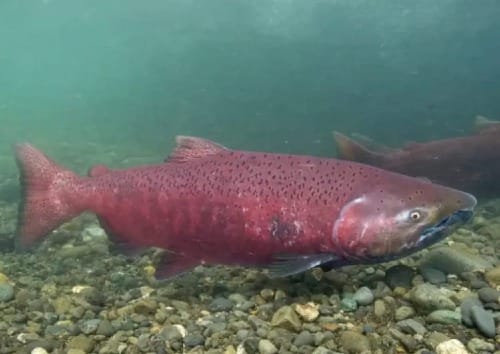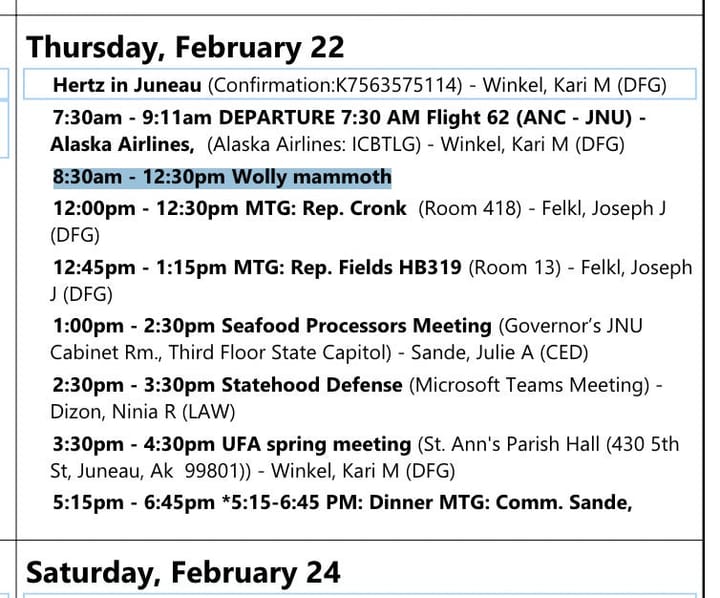Interesting stuff: More from the mammal beat, Dunleavy visits a mining prospect and a tribe's quick reversal in an oil project lawsuit
An update on the fate of The Walrus, coyotes attack Alaska soldiers in Louisiana and Gov. Mike Dunleavy visits a mining prospect in the Alaska Range, which could connect to the West Su Access road.
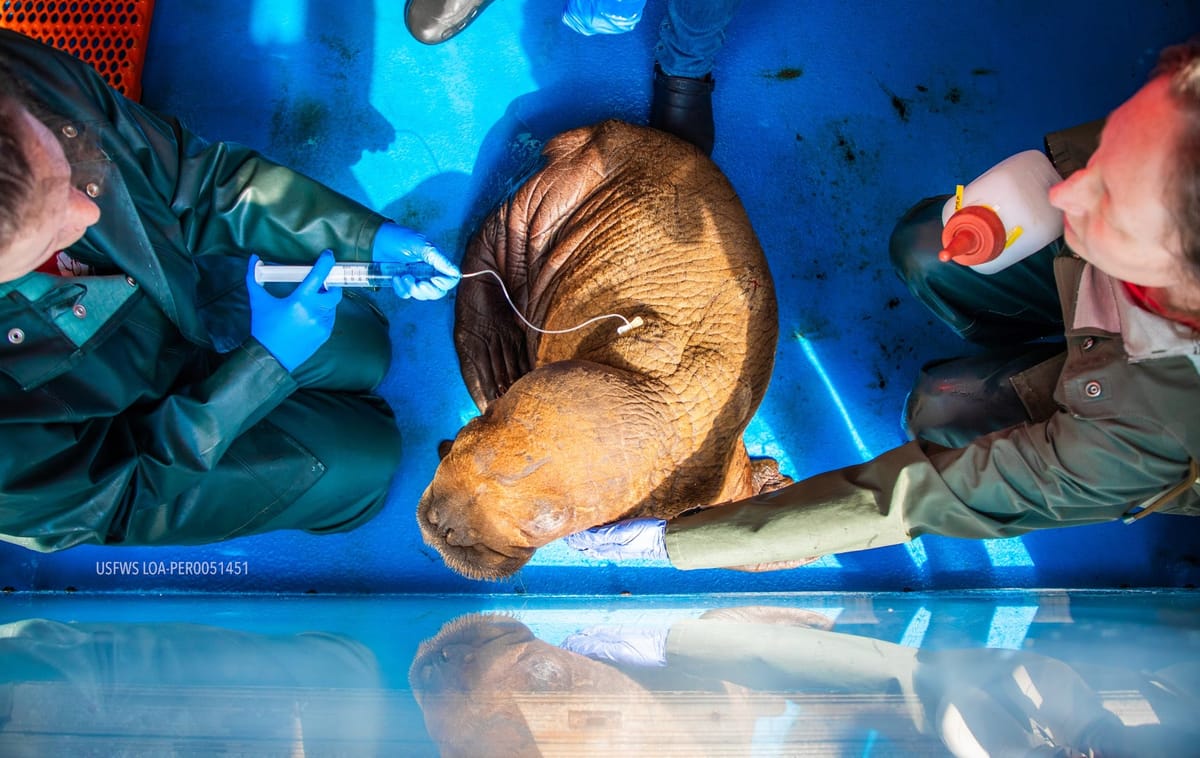
Northern Journal is a newsletter written by me, Anchorage journalist Nat Herz. It’s free to subscribe, and stories are also free to Alaska news outlets to republish through a partnership with the Alaska Beacon.
My goal is reaching the broadest possible audience of Alaskans. But if you can afford it, please consider supporting my work with a $100 annual or $10 monthly voluntary paid membership — these are currently my only sources of revenue for this project. Your support allows me to stay independent and untethered to the demands of the day-to-day news cycle. If you’ve already subscribed, thank you.
This is supposed to be a quiet time of year. But somehow, news keeps happening.
I’m still working on some bigger-picture stories, but for now, here’s some Interesting Stuff — more news from the mammal beat, some gubernatorial and mining industry developments and an item on the lawsuits challenging the Willow project, among others.
Coyotes attack
Alaska can be a hazardous place for members of the military: Just last year, a brown bear killed a soldier at Joint Base Elmendorf-Richardson.
It turns out, however, that similar perils exist Outside: Coyotes recently attacked an Alaska-based National Guard unit training at Fort Johnson, in Louisiana.
“Six Alaska Army National Guard soldiers training at the Joint Readiness Training Center at Ft. Johnson were involved in an incident where an unknown number of coyotes came through their training location,” Guard spokesman Alan Brown wrote in an email. “The soldiers received minor injuries and were promptly taken to the post medical facility, where they were treated and released.”
Brown added: “The incident is being investigated by Ft. Johnson officials.”
The soldiers couldn’t shoot the coyote or coyotes because, according to Brown, they were training with only blank rounds of ammunition.
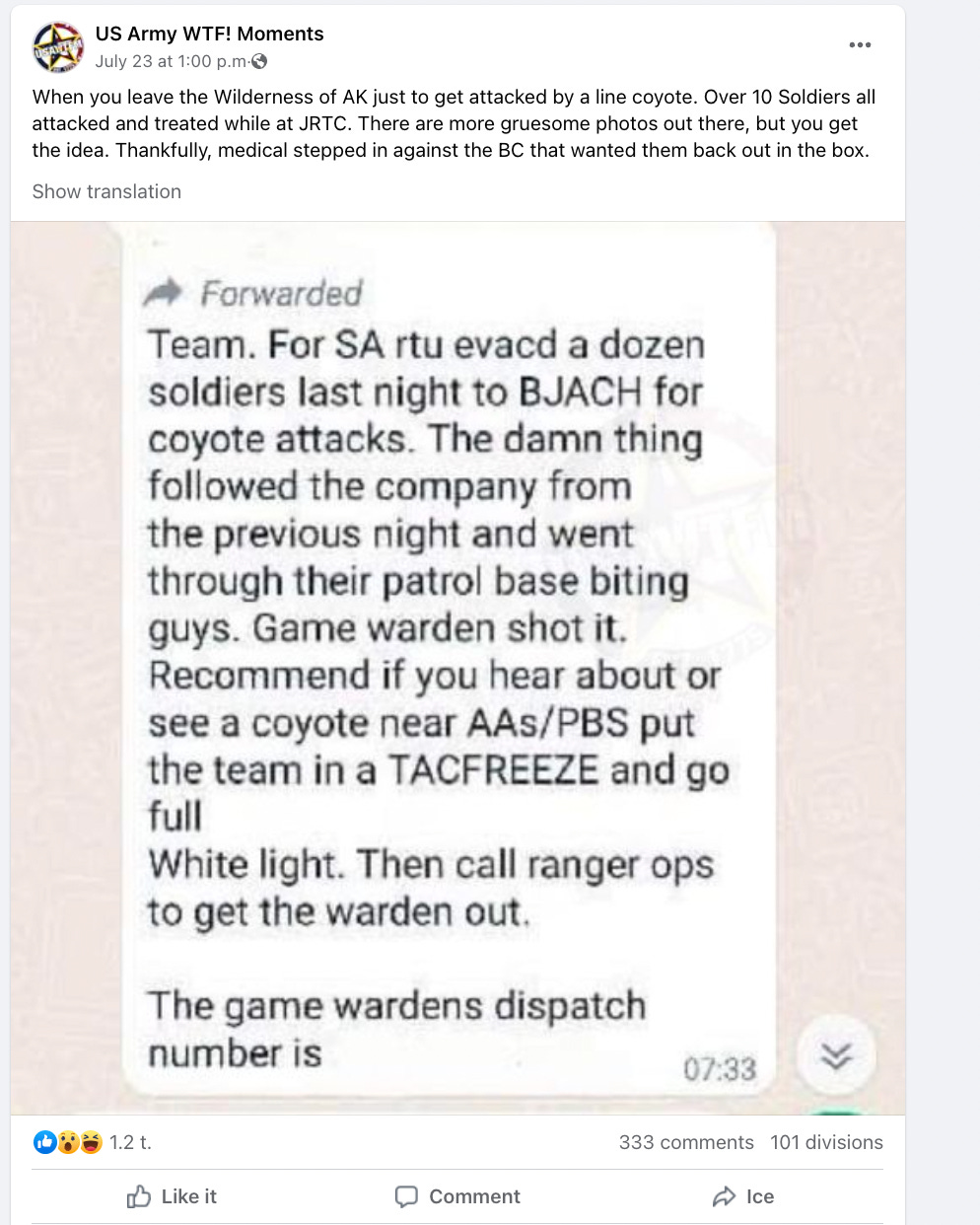
A popular social media account, “U.S Army WTF! moments,” posted about the incident, quipping: “When you leave the wilderness of AK just to get attacked by a…coyote.” The post drew numerous comments critiquing the military for leaving the soldiers without ammunition, along with a response: “Mixing live and blanks gets troops killed.”
Rescued walrus update
The walrus recently rescued from a North Slope oil field road appears to be struggling in its new environment at the Alaska SeaLife Center.
The center, in a social media post this week, said the 200-pound male calf has been "slower to adjust to his formula than we hope," though it added that's not entirely unexpected "when a calf has potentially had a long period of time since nursing from mom."
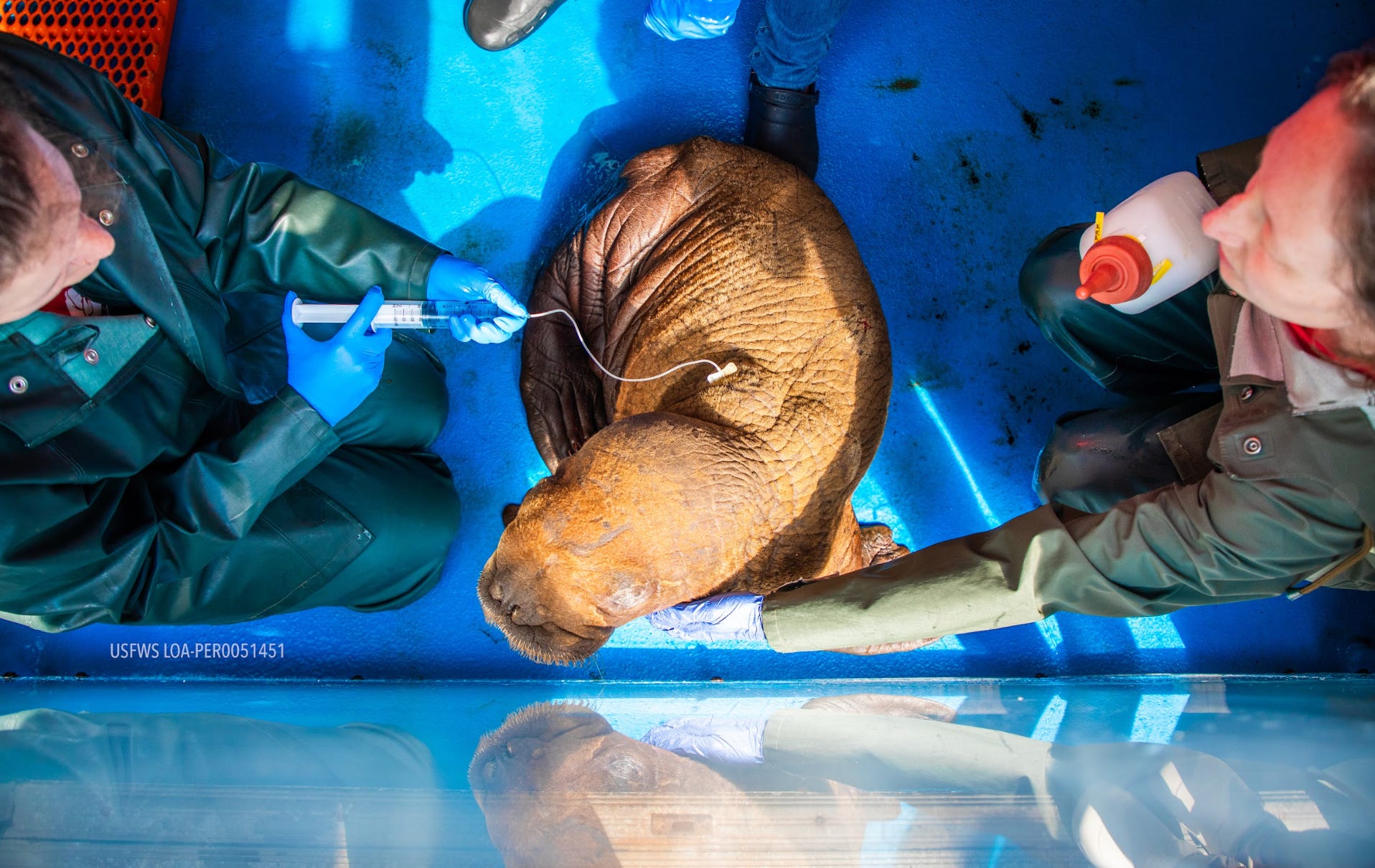
"He also appears to be dealing with a more extensive infection than initially apparent. Our team has adjusted his feeds and treatments to address these concerns," the post said. "We remain cautiously optimistic about his status, but he still has a lot of health conditions to overcome."
Anaktuvuk Pass tribal government files, then withdraws, a legal filing opposing Willow project
Late last month, a tribal government took an unusual stand against the approval of ConocoPhillips’ Willow oil development on the North Slope, where most powerful political interests are strong supporters of the petroleum production that funds the region’s extensive government services.
Then, this week, the tribal government reversed itself, without explanation.
The tribal council in Anaktuvuk Pass, an Iñupiaq village in the Brooks Range, filed 31-page friend-of-the-court briefs July 28 in two separate lawsuits challenging the Willow project in federal court.
The briefs said that the Biden administration failed to adequately consult with the tribe as it reviewed ConocoPhillips’ project proposal, and that the development would exacerbate community members’ existing challenges in harvesting the caribou that they depend on.
Of the North Slope’s eight communities, Anaktuvuk Pass is one of just two that are inland from the coast. That means it lacks easy access to the whales and other marine mammals that help sustain other villages — making caribou an especially important subsistence resource there.
On Monday, however, the tribal council filed a new motion in the cases, asking the judge’s permission to revoke its brief.
“The Naqsragmiut Tribal Council now files this Notice to inform the Court that the Council is withdrawing its previously filed Motion for Leave to File Amicus Curiae,” said the three-sentence filing.
An attorney with the Oregon-based public interest firm representing the tribal council, the Western Environmental Law Center, declined to comment further.
Dunleavy tours West Su Access route and proposed mine
Alaska Republican Gov. Mike Dunleavy and Transportation Commissioner Ryan Anderson last week both visited a remote mining prospect that could connect to a controversial proposed road, the West Susitna Access project.
Australia-based Nova Minerals is developing the Estelle Gold Project, in the mountains of the Alaska Range far from existing infrastructure. Dunleavy’s administration is proposing to build a roughly 100-mile road that could connect the project, and possibly other mining prospects, to the road system and existing infrastructure.
Dunleavy and Anderson quietly visited the Estelle project last week, in a trip that was announced in a Nova Minerals press release but not mentioned by the governor’s office. A photo posted by the company shows Dunleavy standing with workers on a drilling platform perched on a precipitous, scree-covered mountainside, with a helicopter parked behind them.
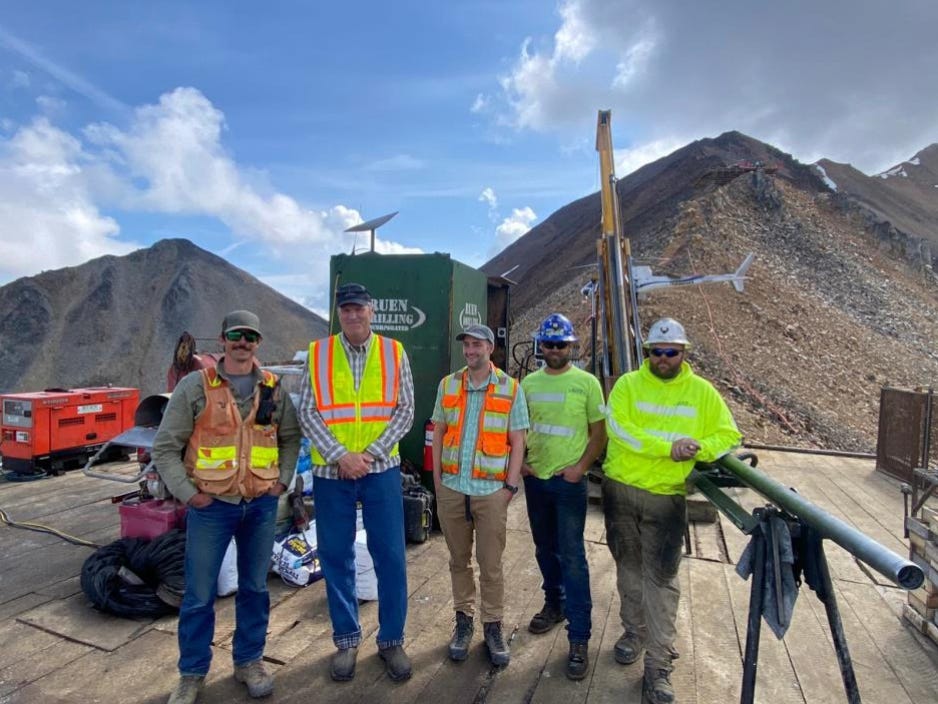
“We were honored and appreciate Gov. Dunleavy taking the time to visit the Estelle Gold Project site this week as we continue our exploration and development activities in pursuit of bringing Estelle into commercial production,” Christopher Gerteisen, Nova Minerals’ chief executive, said in the press release.
A spokesman for Dunleavy, Jeff Turner, said in an email that the governor, “like all previous governors, frequently tours proposed economic development projects.”
The state transportation department recently added $82.5 million for the West Su Access road to its long-range planning document, the Statewide Transportation Improvement Program. Under the Dunleavy administration's current plans, the transportation department is developing a 15-mile stretch of the road that would be open to the public, plus a bridge across the Susitna River.
The Alaska Industrial Development and Export Authority, the state's economic development agency, is evaluating the stretch of road that would reach further west, and which could be limited only to industrial mining traffic — a limitation that some Alaskans have questioned.
Meanwhile, the Matanuska-Susitna Borough Assembly last month voted to pursue state or federal money that could help convert an 18-mile, partially completed rail bed into a road that would link the West Su project to the borough's shipping infrastructure at Port Mackenzie, just across Knik Arm from Anchorage.
Opponents of the road say its stream and river crossings could damage salmon habitat, impact other wildlife populations and change the area’s wilderness character.
The Susitna River Coalition, a Talkeetna-based advocacy group, recently launched a radio ad campaign that called the road "AIDEA's next failed project."
“Alaskans shouldn’t be footing the bill to fatten the bank accounts of foreign mining executives when our community roads need help,” it said.
Patkotak draws opponent in race for North Slope Borough mayor
The North Slope Borough mayoral election is turning into a dynamic contest, with Iñupiaq leader John Hopson Jr. joining the race that already includes Utqiagvik independent state Rep. Josiah Patkotak.
Hopson, who’s from the village of Wainwright, serves on the borough Assembly and has held numerous other leadership positions in the region. He placed second in the last North Slope mayoral election, in 2020, when he lost to incumbent Harry Brower Jr.
Hopson filed paperwork late last month to register for the race. In 2020, he said on his website that his campaign was chaired by Crawford Patkotak, Josiah’s father, but in a text message, Crawford said he would be supporting his son’s campaign this time around.
Northern Journal is a reader-supported publication. To receive new posts and support my work, consider becoming a free or paid subscriber.

